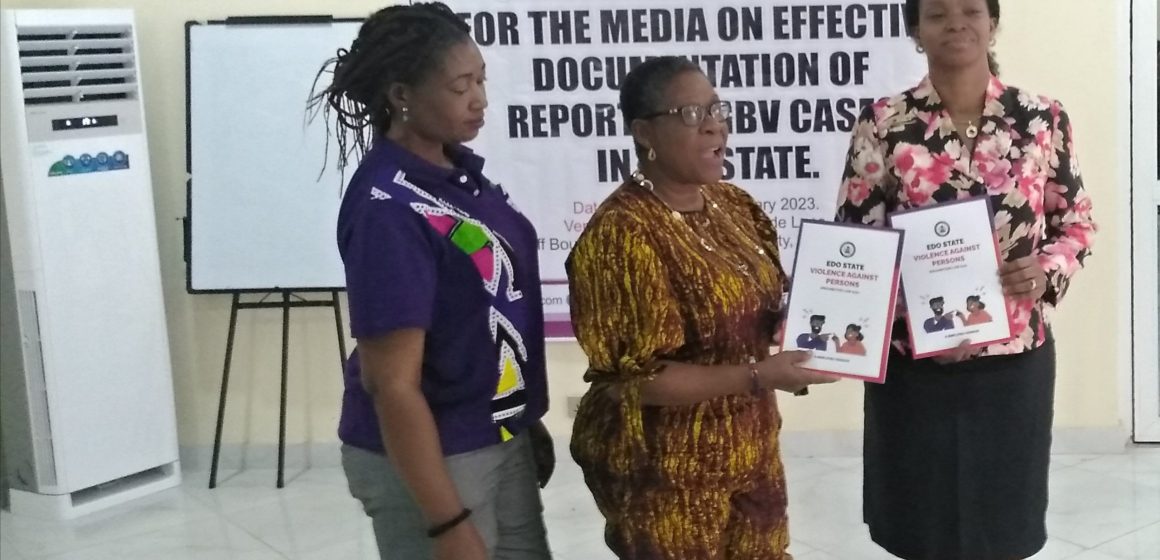From Iguobaro Osaigbovo
Strengthening reporting pathways for survivors of Sexual and Gender-Based Violence create better understanding and awareness about the procedures for investigating and reporting related cases of survivors who require psychosocial support not to compound existing challenges.

Debates about reporting SGBV cases bother on about what next? Where does the media glean data from? Do journalists really have access to the right information about SGBV? What about the code of ethics in reporting incidents of GBV and investigations? The foundation of these complexities are rooted on policy monitoring and Evaluation.
To fill the knowledge-gap and enhance the efficiency among media practitioners, the Women’s Rights and Health Project, recently organized a dialogue programme with Edo State media practitioners on how to tackle emerging threats and challenges as well remind the practitioners of their duties towards a better society.
In a presentation during the training, Bose Ironsi, the Executive Director, Women’s Rights and Health Project, called for greater commitment on the part of the media in reporting SGBV cases and the need for follow up stories.
Better understanding of the pros and cons of the issues at stake, and the rules of engagement in order to create problems while trying to kill the monster through information sharing, capacity building and sustained advocacy.
“It is important that we have a clear understanding of information that we have, the Women’s Rights and Health Project, Bose Ironsi said, while highlighting the gains so far.
She recommended that increased media reporting and documentation of SGBV cases remain a strategy to increase public awareness and action that could reduce the incidence of violence against women and girls.
How well has the Media lived up to its billing in leveraging on SGBV support structure?
The Executive Director, Women’s Rights and Health Project, welcomed the ongoing strengthening of the Vivian Sexual Assault Referral Centre (SARC) for continuous provision of psychosocial, legal and medical support for SGBV survivors in Edo State.
Inspite the prospects and breakthroughs, Bose expressed shock over the low level of awareness about SARC in the State among journalists. She solicited for partnership and more hands in sensitization and awareness creation across the State of the VAPP law to advocate its effective implementation.
Enhancing Gender equality and protection from Gender-based violence survivors SGBV which is among the core objectives of the Edo VAPP law after the omnibus piece of legislation was domesticated in 2021.
Aside the Executive, Legislature, and the Judiciary, the media occupy the fourth quadrant in Nigerian society. In addition to its core functions as an informer, educator, entertainer, advertiser, critic and influencer, the media is supposed to be an agenda setter through its editorialising of opinions.
In the quest for enablers that aid the police to respond promptly to reported cases of SGBV and ensure speedy dispensation of justice as captured in the Administration of Criminal Justice Law (ACJL), the role mass media, count in view of the critical role in the society.
Again, the Executive Director insisted that increasing capacity building opportunities by way of training and retraining to equip agencies and Ministries tasked with the duty of implementing these laws, alongside members of the judiciary with necessary skills are desirable.
The need for partnership
Speaking at the training, Mrs Irenosen Ihensikhien, a Director in the State Ministry of Social Development and Gender issues, appealed to the Media to raise campaign for survivors of GBV to get succour.
“Edo State government has zero tolerance for GBV,” according to her, “At our own level, let us do what we need to do so that this message will be passed to all nooks and crannies”.
On their part, Mrs. Charity Chris-Ebosele, the Director, Citizen Rights Department, Edo State Ministry of Justice, gave a good account of the Ministry which is saddled with the responsibility of handling cases of domestic violence and other related matters, while Akpojevba Juliet, took participants down memory lane about the areas the NGO has recorded breakthroughs in reducing SGBV through sensitization and awareness creation in worship centres, schools, markets and other areas.
In a bid to sustain the advocacy and win the fight against GBV, Women’s Rights and Health Project, which was supported by Open Society of Africa, donated 250 copies of the simplified VAPP laws to Edo State Ministry of Social Development and Gender Issues and presented a total of 100 copies of the law to the Ministry of Justice.








Leave a Reply